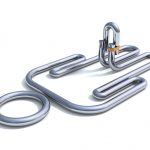One Ring to Rue Them All
April 28, 2022 Return



Assoc Prof Dr Christopher Ho Chee Kong Consultant Urologist & Sexual Medicine Physician, Department of Surgery, Universiti Kebangsaan Malaysia Specialist Centre
Let us spare a thought for the man who made news in May when he landed in the hospital after having his scrotum stuck in a ring. While everyone probably had a chuckle over it, there was no doubt that his pain was intense and his condition could have taken a turn for the worse if not tended to.
Consultant urologist and sexual medicine physician, Assoc Prof Dr Christopher Ho is no stranger to patients with painful misadventures involving their little buddies. He recalled a similar case in which he had to borrow tools from the nearby fire department to remove a penile ring that was causing his patient great pain.

Put a ring on it?
Dr Ho says that there are legitimate medical uses for penile rings and implants. Men with erectile dysfunction (ED) may use a vacuum pump to help them achieve an erection, and, a ring can be placed at the base of the shaft to sustain the erection.
“However, these rings should be used only upon the advice of a qualified healthcare professional, for specific reasons such as ED,” Dr Ho points out. Otherwise, there may be painful consequences – as seen in the case of that unfortunate person who ended up in the news.
“The ring prevents blood from flowing out of the penis, which leads to engorgement and increase in girth,” says Dr Ho. For some men, especially those with ED, this sounds like a cause for celebration.
But if blood flow is obstructed for too long, the tissues of the penis become deprived of oxygen. Waste materials such as toxins will begin to accumulate, as the blood trapped in the penis is unable to leave and carry these wastes with them. Over time, these tissues may become damaged and even die, causing all kinds of problems such as ED and more.
A condition called priapism may also occur. This is a condition in which an erect penis cannot revert to its flaccid state after more than four hours. This is a painful condition, and in extreme cases, an amputation may be required. (Ouch!)
If you insist on wearing a penile ring, Dr Ho advises to limit its use to no more than 30 minutes.
Piercings and other “fashion statements”
There are men who subject their penises to other kinds of accessorising, often for aesthetic reasons or, because they believe that it would enhance their sexual prowess.
Dr Ho has come across several patients who tried to embed materials such as ball bearings into their penile shaft. “One tried to perform this procedure on his own, and ended up blocking the urethra – the passage through which urine and semen find their way out of the penis. He could not urinate, and had to be admitted under great pain.”
Piercing is another practice that has its share of painful pitfalls. Pierce the wrong part at the wrong place or even the wrong depth, and the tissues responsible for producing an erection may end up irreparably damaged. Dr Ho also points out that there is also a risk of infection, especially if the person does not exercise proper hygiene down there.
The final call
Dr Ho admits that it is possible that rings, piercings and even the ball bearings may provide increased sexual pleasure to certain men and their partners, but the risks have to be seriously considered.
Complicating the issue further is the fact that selling sex toys is illegal in this country, and services such as piercing the penis are usually performed by untrained personnel. As a result, there is no testing done to ensure that those products or services are effective, and no guarantee that they are safe.
At the end of the day, it is a Wild, Wild West out there when it comes to all these devices and styles, so try them out at your own risk. If you love your friend down below, perhaps it is wiser – and safer – to stay accessory-free.
If you suffer from erectile dysfunction or other problems that affect your sexual performance, you should consult a qualified healthcare professional for safer options.
If you like this article, do subscribe here.

